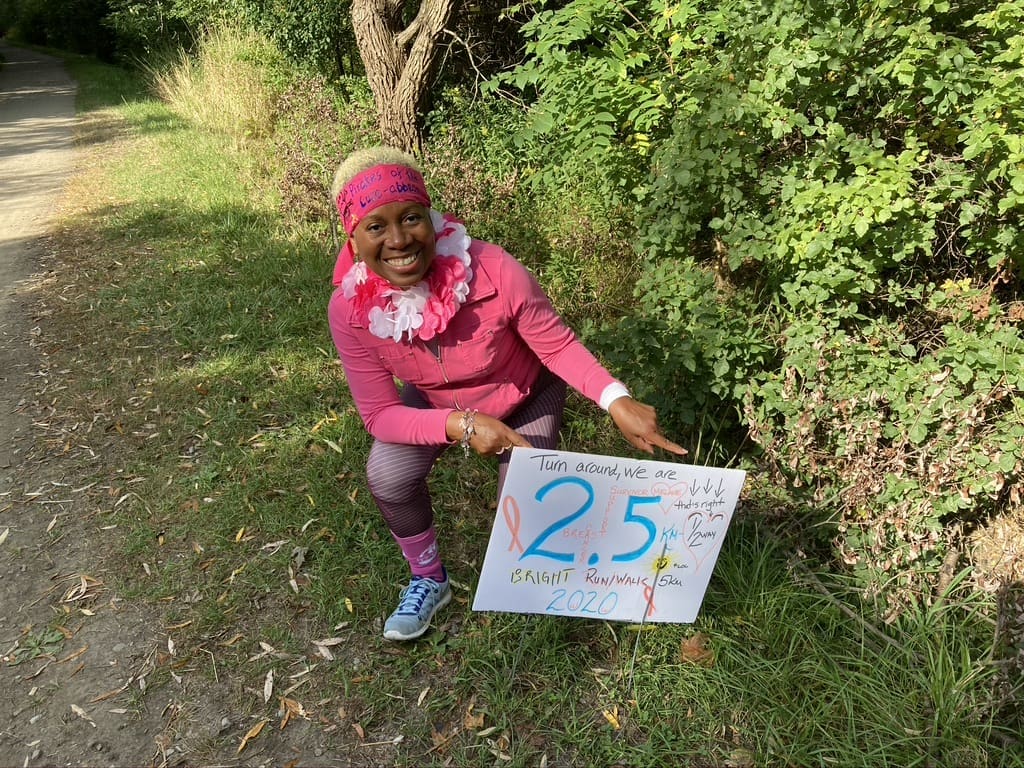Dr. Juliet Daniel knows that breast cancer research is crucial – and she knows it from two sides of the equation.
As a breast cancer survivor, she knows she has benefited from research performed in the past. As a researcher, BRIGHT Run funding helped her get critical breast cancer research off the ground.
So it’s no surprise that the McMaster Biology professor and Faculty of Science Associate Dean Research and External Relations has been a committed member of the BRIGHT Run family since launching her team in 2009.
“I like the small, local, community nature of the BRIGHT Run,” said Juliet, the BRIGHT Run’s 2021 survivor spokesperson. “It has energy, enthusiasm, creativity…and very personal connections among participants.”
Born in Barbados, Juliet came to Canada in 1983 to attend university, the first member of her family to do so.
Juliet had applied to several Canadian universities. She chose Queen’s University in Kingston, largely because Queen’s sent bi-weekly envelopes full of information about Kingston and Queen’s which made her and her parents feel like Queen’s was already treating her like family.
After completing a Bachelor of Science degree in Life Sciences, Juliet obtained her PhD in Microbiology at the University of British Columbia, Vancouver and moved on to postdoctoral fellowships at St. Jude’s Children’s Research Hospital in Memphis and Vanderbilt University in Nashville, both in Tennessee. Her career at McMaster University began in 1999 and continues today.
During her postdoctoral fellowship, Juliet discovered the gene Kaiso, naming it after her favourite calypso music. She found that the Kaiso protein regulates genes involved in cell proliferation and motility, which is how breast and other cancers grow and spread.
Juliet was diagnosed with breast cancer in February 2009. Hers was a complex case; she underwent surgery and was prescribed a drug regimen aimed at preventing the cancer from recurring.
Up to that point, Juliet was involved in “basic breast cancer research.” After attending a 2008 American Association of Cancer Research conference, she became interested in Triple Negative Breast Cancer (TNBC), an often- aggressive and difficult-to-treat form of cancer that women of colour (Black and Hispanic) are particularly susceptible.
“I wanted to do research to give back to the Caribbean,” Juliet said. “I was on sabbatical in 2011 and started the TNBC research project in Barbados.”
She applied twice – unsuccessfully – for funding from a national organization that funds breast cancer research.
Not one to give up easily, Juliet applied for and received a BRIGHT Run grant in 2014 that allowed her to start her TNBC research. She used the work funded by the BRIGHT Run to apply – for a third time – to the national funding organization, and her third try was the charm! That grant covered three years of research but was not renewed in 2018. A grant from the Canadian Institutes of Health Research in 2020 will keep the research going until 2025.
“We are way behind where we should have been because of our difficulty in getting funding,” Juliet said. “The BRIGHT Run funding got things rolling and for that, I am eternally grateful.”
Each year, Juliet’s BRIGHT Run team, the Pirates of the Cure-abbean, is anchored by the “triumvirate” – Mac colleagues Sigal Balshine, a professor of Psychology, Neuroscience and Behaviour, and Mathematics professor David Earn. Each year, a variety of lab associates, students and friends round out the team.
From the outset, Pirates of the Cure-abbean has consistently raised more than $10,000 each year. Juliet says most of the team’s fundraising is done via e-mail.
In the virtual 2020 BRIGHT Run, a handful of team members went to Dundas Valley Conservation Area to do their BRIGHT walk, taking photos at various markers along the way.
On event day 2021, Juliet was live on Facebook with event chair Nancy McMillan to help launch this year’s virtual BRIGHT Run event.
“The BRIGHT Run has a really awesome vibe,” she said. “It’s filled with hope and joy. And I am so happy to be a part of it.”
